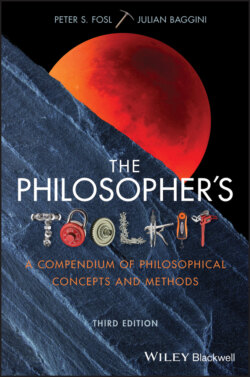Читать книгу The Philosopher's Toolkit - Julian Baggini, Julian Baggini - Страница 76
A long tradition
ОглавлениеHistorically, many philosophical questions are, in effect, quests for adequate definitions. What is knowledge? What is beauty? What is the good? Here, it’s not enough just to say, ‘By knowledge I usually mean something like …’. Rather, the search is for a definition that best articulates the concept in question and does so in as general or universal a way as possible. Much of the philosophical work related to definition takes the form of conceptual analysis or the attempt to unpack and clarify the meanings of important concepts. What is to count as the best articulation or a proper analysis, however, requires a great deal of debate. Indeed, it’s a viable philosophical question as to whether or not many philosophy concepts actually can be defined. Perhaps some concepts are so complex that they can’t be compressed into a reasonably compact formulation. Perhaps the best that can be done is to become familiar with their usages by just diving into the network of philosophical theory in which they appear.
Many philosophers have not been deterred. For some that’s because of their philosophical commitments concerning the nature of reality and human epistemic powers. Ancient and medieval thinkers (like Plato and Aquinas), for example, seem to have been confident about the project of formulating adequate definitions because they were committed to the idea that reality includes essences or natures that exist independently of us and that define what things truly are (4.12). Moreover, these thinkers were convinced that human beings possess the capacity to apprehend those essences and formulate them in language. Many more recent thinkers (like some pragmatists and post‐structuralists) have held that definitions are nothing more than conceptual instruments that organise our interactions with each other and the world. That is so because recent philosophy has in large measure abandoned the idea that human language can meaningfully formulate real, independent essences or even that such essences exist.
The labor of analysing concepts has been related too to philosophical criticisms of philosophy itself. Some thinkers have gone so far as to argue that virtually all philosophical problems are at the end of the day rooted in nothing more than failures to understand how ordinary language functions. Resolving those puzzles, from this point of view, entails clarifying the way we use language so as to eliminate the confusions upon which philosophy generates its conundrums. While, to be accurate, this project demands more than just scrutinising definitions, it does show just how deep the philosophical preoccupation with getting language right runs.
